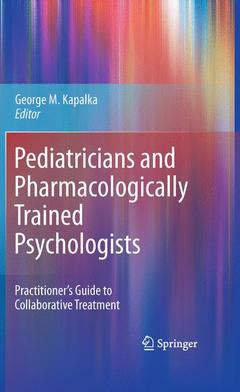Pediatricians and Pharmacologically Trained Psychologists, 2011 Practitioner’s Guide to Collaborative Treatment
Coordonnateur : Kapalka George M.

Many factors affect treatment options for children and adolescents with mental health problems, including age, severity of symptoms, financial and time constraints, and access to qualified professionals. With the limitations of managed care plans and the shrinking pool of pediatric psychiatrists, the trend is toward pediatricians prescribing psychotropic medicines. Pharmacologically trained psychologists can offer valuable assistance to pediatricians caught in this predicament.
Tackling fundamental questions of when to treat as well as when and why to refer young patients, the Pediatricians and Pharmacologically Trained Psychologists examines commonly occurring pediatric conditions requiring joint treatment; reviews theoretical models of consultation and collaboration; and spotlights professional issues typically arising from these team efforts.
With pertinent clarity and detail, this volumeoffers in-depth discussion in these key areas:
- Collaborative treatment of mental health conditions, including mood, disruptive, anxiety, and eating disorders.
- Collaborative treatment of medical conditions, focusing on gastrointestinal disorders and diabetes.
- Changing clinical procedures in states that have enacted prescriptive authority for psychologists.
- Expanding roles for pharmacologically trained psychologists practicing in states that have not enacted prescriptive authority for psychologists. Medical psychology in the pediatric hospital.
- Integrative care in rural settings and on the reservation.
- The collaborative future: brain marker technology, training paradigms, and more.
Pediatricians and Pharmacologically Trained Psychologists is a must-have reference for a broad range of researchers, professionals, and graduate students, including psychologists, pediatricians and other child mental health clinicians as well as nonphysician prescribers, such as nurses, physician assistants, and pharmacists.
Preface.- About the Editor.- List of Contributors.- Part I: Foundations of Collaborative Care.- Psychology, Psychopharmacotherapy and Pediatrics: When to Treat and When to Refer.- Collaboration between Pharmacologically Trained Psychologists and Pediatricians: History and Professional Issues.- Part II: Collaboration with Pediatricians in Specific Settings.- The Clinical Experience of RxP-Trained Psychologists Working in Non-RxP States.- The Practice of Medical Psychology in an RxP State: New Opportunities for Comprehensive Pediatric Care.- Integrated Care in Rural Settings.- Collaborative Practice with Pediatricians within the Indian Health Service: Taking Care of Frontier Children.- The Practice of Medical Psychology in a Pediatric Hospital Setting: A Personal Account from an RxP State.- Part III: Collaboration with Pediatricians in Treatment of Specific Disorders.- Collaborative Treatment of Disruptive and Mood Disorders.- Collaboration between Pediatricians and Pharmacologically Trained Psychologists in the Treatment of Anxiety Disorders in Pediatric Patients.- Collaborative Treatment of Eating Disorders.- Collaborative Treatment of Medical Disorders: The Management of Diabetes.- Collaborating with Pediatricians and Gastroenterologists: A Biopsychosocial Approach to Treatment of Gastrointestinal Disorders.- Part IV: Future Directions in Pharmacological Collaboration.- Brain Markers: An Emerging Technology with Potential to Enhance Collaboration Between Pediatricians and Pharmacologically Trained Psychologists.- Internship and Fellowship Experiences: Preparing Psychology Trainees for Effective Collaboration with Primary Care Physicians.- The New Face of Psychology Predoctoral Training: Psychopharmacology and Collaborative Care.- RxP Training Informs the Practice of Supervision of Non-Pharmacologically Trained Mental Health Practitioners.
George M. Kapalka earned his PhD in Clinical Psychology from Fairleigh Dickinson University, and holds board certifications in several areas of practice, including clinical psychology, psychopharmacology, child and adolescent psychology, learning disabilities, and forensic psychology. He is an associate professor (tenured, graduate faculty appointment) at Monmouth University where he currently serves as the Interim Chair of the Department of Psychological Counseling. Dr. Kapalka previously taught at several universities, including Fairleigh Dickinson University (within the PhD program in Clinical Psychology) and the New York Institute of Technology (where he served as the Director of Counselor Education).
Dr. Kapalka is licensed to practice psychology in NJ, NY, PA and NM and has been in practice for over 20 years. He maintains a private practice that primarily focuses on the treatment of children and adolescents with learning and emotional disorders. Dr. Kapalka completed level 3 psychopharmacology training through the Prescribing Psychologists’ Register, and in his practice he frequently consults with pediatricians about the use of medications in the treatment of children and adolescents. For over a decade, he has been a member of medical staff at Meridian Health, Brick Hospital Division, a primary care hospital. In addition, Dr. Kapalka is school-certified in New Jersey and heads a state-accredited Independent Child Study Team.
Dr. Kapalka’s research program has focused on the education and treatment of youth with disruptive disorders, as well as the use of nutritional and herbal supplements in the treatment of children and adolescents. He is an author of four books and dozens of professional publications and presentations. Dr. Kapalka is active in professional and community education and has held dozens of workshops for medical and mental health professionals, teachers, and parents. Dr. Kapalka has been interviewed in newspapers, Internet publica
Provides specific guidance on how to establish effective collaborative practice between pharmacologically trained psychologists and pediatricians in the treatment of psychological and medical disorders that commonly occur in the pediatric population.
Examines the theoretical models that guide collaborative practice, with specific focus on the application of these models to the interface between pediatricians and pharmacologically trained psychologists.
Includes supplementary material: sn.pub/extras
Date de parution : 01-2011
Ouvrage de 303 p.
15.5x23.5 cm
Thèmes de Pediatricians and Pharmacologically Trained Psychologists :
Mots-clés :
ADHD; Adjustment; Anxiety; Behavior Control; Bipolar disorder; Clinical child psychology; Consultation; Depression; Developmental disorders; Impulse control; Medical disorders; Models of consultation; Pediatric care; Pediatric psychology; Pediatricians; Pediatrics; Pharmacologically trained psychologists; Pharmacology; Tic disorders; Trauma



